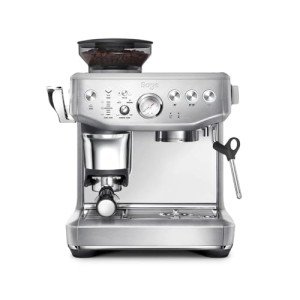How Energy-Efficient Espresso Machines Was The Most Talked About Trend In 2024
Energy-Efficient Espresso Machines: A Comprehensive Guide
On the planet of coffee enthusiasts, espresso machines are frequently considered important appliances for developing rich, aromatic coffee. Nevertheless, the energy consumption associated with these machines can cause increased utility expenses and environmental concerns. As consumers end up being more eco-conscious, energy-efficient espresso machines have actually become a popular choice. This article aims to explore the functions, advantages, and choices offered in energy-efficient espresso machines, helping coffee lovers make notified choices.
What Makes an Espresso Machine Energy-Efficient?
Energy-efficient espresso machines are developed to reduce energy consumption while keeping optimal efficiency. Numerous functions add to the energy efficiency of these machines:
Insulation: High-quality insulation helps maintain heat, lowering the energy required to preserve optimum developing temperatures.
Smart Technology: Many modern machines are geared up with programmable settings that allow users to set up developing times and change to standby mode when not in use.
Quick Heat-up Time: Energy-efficient espresso machines often use advanced heating innovations, such as thermoblocks or PID controllers, to heat water quickly.
Low Wattage: Machines that operate at lower wattages consume less energy in general, making them more effective.
Vehicle Shut-off: Automatic shut-off includes make sure that the machine turns off after a specific period of inactivity, further minimizing energy waste.
Benefits of Energy-Efficient Espresso Machines
Investing in an energy-efficient espresso machine can provide several benefits:
Cost Savings: Over time, lower energy usage can lead to reduced electrical power costs.
Environmental Impact: Using less energy minimizes carbon footprints, making these machines a more sustainable option for ecologically mindful customers.
Enhanced Performance: Many energy-efficient models likewise provide remarkable developing innovations, leading to better-tasting espresso.
Resilience: Typically, energy-efficient machines are developed with high-quality components, resulting in greater longevity.
Functions to Consider
When picking an energy-efficient espresso machine, numerous functions must be taken into consideration:
- Type of Machine: Options include manual, semi-automatic, and totally automatic designs, each with varying degrees of user control and automation.
- Brew Quality: Look for machines that use high-quality developing systems to guarantee optimum flavor extraction.
- Maintenance: Some machines have self-cleaning functions that can conserve energy and effort in maintenance.
- Capability: Depending on individual or family size, machine capacity can impact energy consumption, with larger machines typically requiring more power.
Popular Energy-Efficient Espresso Machines
The market uses a range of energy-efficient espresso machines dealing with various requirements and preferences. Below are some significant designs:
Brand
Design
Key Features
Energy Consumption
Breville
Barista Express
Integrated grinder, PID temperature level control, fast heat-up.
Low
DeLonghi
EC155
Compact size, easy to use, durable develop.
Moderate
Rancilio
Silvia
Durable design, excellent temperature stability, and has a low environmental impact.
Moderate
Gaggia
Timeless
Dependable manual operation, long lasting brass components, and effective steaming ability.
Low
Jura
E8
Totally automatic, clever functions, and a detachable brew group for simple cleansing.
Low
Tips for Optimal Energy Efficiency
Aside from picking an energy-efficient model, consumers can adopt a number of practices to take full advantage of energy performance:
- Preheat: If your machine has a pre-heating function, use it to ensure that the optimal temperature is reached quickly before developing.
- Turn Off After Use: Always switch off the machine after developing or make use of machines with automobile shut-off functions.
- Routine Maintenance: Keep the machine properly maintained to ensure it operates effectively and effectively.
FAQs About Energy-Efficient Espresso Machines
1. Are energy-efficient espresso machines more costly?
While the initial financial investment may be higher for energy-efficient designs, the long-term savings on electrical power expenses can balance out the initial cost. Furthermore, lots of energy-efficient machines featured advanced features that improve the brewing experience.
2. How do Bean To Cup Espresso Machines understand if an espresso machine is energy-efficient?
Look for indicators such as Energy Star certification, user reviews, and requirements regarding wattage and heat-up time. Machines with specific features targeted at decreasing energy intake are normally developed for much better efficiency.
3. Can I use an energy-efficient espresso machine for other coffee styles?
Many energy-efficient espresso machines offer adaptability, permitting users to brew various coffee styles beyond espresso, such as lattes and cappuccinos, by including steaming abilities.
4. Do energy-efficient models sacrifice quality for efficiency?
Not always. Lots of energy-efficient espresso machines are equipped with high-quality brewing innovation that can boost flavor extraction while minimizing energy usage.
5. What upkeep is required for energy-efficient espresso machines?
Regular upkeep involves cleaning the machine, descaling when required, and regularly checking seals and gaskets to ensure ideal performance and energy effectiveness.
Energy-efficient espresso machines represent a perfect mix of performance, cost savings, and environmental duty. By thinking about numerous features, benefits, and brand names, customers can pick a design that fits their unique choices while contributing favorably to the environment. As the trend towards sustainable living grows, the appeal of energy-efficient devices, including espresso machines, is most likely to continue its upward trajectory, providing coffee lovers a guilt-free method to enjoy their daily dosage of espresso.
